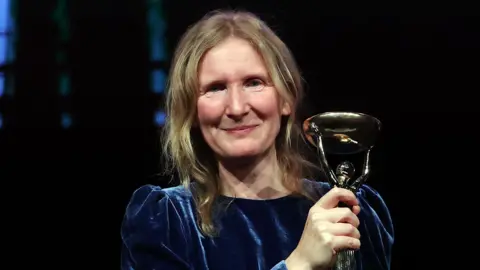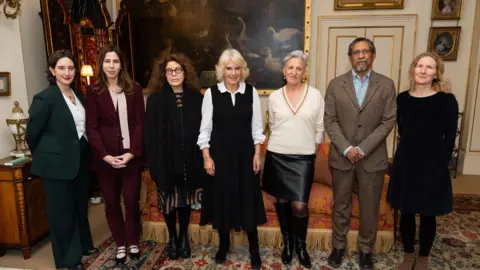 PA Media
PA MediaBritish author Samantha Harvey has won the 2024 Booker Prize award with her novel Orbital, the first book set in space to win the prize.
Orbital contemplates the world from a different viewpoint as it follows a team of astronauts in the International Space Station.
It’s the biggest-selling book on the shortlist in the UK, and has also outsold the past three Booker winners combined, up to the eve of their success.
Harvey, the first woman to win the award since 2019, was announced as winner at a ceremony in London’s Old Billingsgate, and will take home £50,000.
She dedicated the prize to “all the people who speak for and not against the earth and work for and not against peace”.
She said she questioned herself while writing the book: “Why would anybody want to hear from a woman at her desk in Wiltshire writing about space when people have actually been there?”
“I lost my nerve with it and I thought I didn’t have the authority to write it.”
Speaking to BBC News, Harvey said she was “in complete shock and very overwhelmed”. She added that the award would change her life.
Asked how she would spend the £50,000 prize money, she said: “I need to buy myself a new bike, and it’s going to be a good bike.”
‘Beauty and ambition’
Chair of the judges, Edmund de Waal, described Orbital as a “book about a wounded world”.
He said the judges all recognised its “beauty and ambition” and praised her “language of lyricism”.
Writing it, Harvey said she “thought of it as a space pastoral – a kind of nature writing about the beauty of space”.
The 136-page long story, which is Harvey’s fifth novel, takes place over a single day in the life of six astronauts and cosmonauts.
During those 24 hours they observe 16 sunrises and 16 sunsets over their silent blue planet, spinning past continents and cycling past seasons, taking in glaciers and deserts, the peaks of mountains and the swells of oceans.
It is the second-shortest book to win the prize, and covers the briefest timeframe of any book on the shortlist. The shortest winning novel in the history of the prize was 1979’s Offshore by Penelope Fitzgerald, at 132 pages.
Harvey previously told BBC Radio 4’s Front Row programme she wrote Orbital over the course of successive lockdowns.
“I was writing about six people trapped in a tin can. It felt like there was something resonant about that and our experience of lockdown, of not being able to escape each other and also not being able to get to other people.”
Harvey previously made the longlist for the Booker Prize in 2009 with her debut novel, The Wilderness.
 PA Media
PA MediaThis year’s shortlist had five women on its six-strong shortlist – the largest number of women represented in its 55-year history.
The other nominees were:
- James – Percival Everett (US)
- Creation Lake – Rachel Kushner (US)
- Held – Anne Michaels (Canada)
- The Safekeep – Yael van der Wouden (Netherlands)
- Stone Yard Devotion – Charlotte Wood (Australia)
The prestigious prize is open to works of fiction written in English by authors anywhere in the world and published in the UK or Ireland.
Previous winning authors include Margaret Atwood, Hilary Mantel, Bernardine Evaristo and Salman Rushdie.

